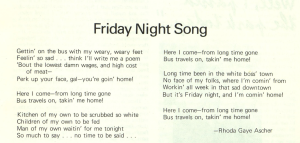
Published in the February 1971 issue of Up From Under, Rhoda Gaye Ascher’s “Friday Night Program” establishes the struggles of a working mother. This poem highlights a mother’s state of exhaustion because of societal expectations.
The poets of the Women’s Liberation Movement unify readers through their candid recounts of their shared experiences as both a mother and a worker. In Up From Under’s second issue’s editorial statement, published in September 1970, the editors describe the struggles of women, who are mothers and workers. They state “if a woman works outside the home because of economic need she is forced to have two full-time jobs, as she still must fulfill her primary function as housewife and mother” (Albert et al. 2). In the February 1971 issue of Up From Under, the editor featured Rhoda Gaye Ascher’s poem titled “Friday Night Song,” which explores this burden. The speaker details a mother and wife’s labor following her own full day of work. She considers:
Kitchen on my own to be scrubbed so white
Children of my own to be fed
Man of my own waitin’ for me tonight
So much to say. (Ascher 24)
Ascher emphasizes that many women work full time jobs to support their family; however, unlike their husbands, they do not have the privilege of relaxation when returning home. Instead, women, particularly mothers, are expected to clean and maintain the house while also raising the children. In this piece, Ascher highlights that she must do all her household work “on my own…with my weary, weary feet” (Ascher 24). Here, she underlines her exhaustion, which her state of constant service perpetuates. Even though she returns home for the weekend, the only reprieve she receives is from her societally-approved job. Society treated motherhood and housework as women’s obligatory duties. They did not value the dedication required to raise a child and tend to a family’s needs. Yet, feminist poets, like Ascher, strive to overcome society’s failures. In their poetry, they endow recognition of a mother’s hard work. Therefore, readers, many of whom are mothers, feel heard and understood. Up From Under unites the readers, invigorating them to upend society’s disregard for mothers’ arduous experiences.
Sources:
Albert, Marilyn, et al., editors. Up From Under, vol. 1, no. 2, 1970, pp. 1–69.
Ascher, Rhoda Gaye. “Friday Night Song.” Up From Under , vol. 1, no. 3, 1971, pp. 24.
